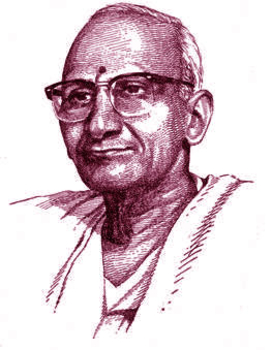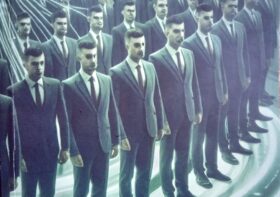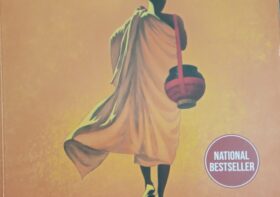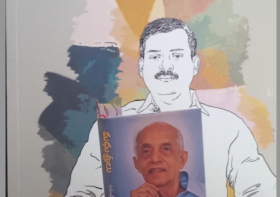Samudrapu Dibba

There is subtle humour in the line below. I am not sure if this can even be translated into english ..
ఆ దేశమున నుద్యోగము చేయుటయే పురుషలక్షణముగా భాషించుచుండెను. ఇంక నే విధముగను పురుషుడు పురుషుడగుట లేదు
Elsewhere, Viswanatha laments about how cobblers (in that country in the novel) who cannot sell stuff manufactured by themselves become mere repair personnel. They all then convert to a different religion i.e., an expansionist religion. We all know what he is talking about! I still believe that it is only because of destruction of the base of indian economics by a clearly inhuman and violent economics that the caste system has become what it is today. Once the economics was destroyed, what was left were the differences, which by themselves had no meaning unless backed up by economics and means of earning a livelihood. So before we mock the caste rules today, we need to be cognizant of why they are what they are. To understand the historical need for the differences, to understand the ecological prudence behind the rules of association and rules of abandonment etc. But who wants to do all this now?. All we like to do is to say someone is casteist or act like those famed english tv anchors and scream “yikes!! he is a hindoo fundemantalist. he is a communal” so on and smear black crease and cow dung on their faces. I feel that this was a system that ensured sufficiency for all before superfluity for some. I feel today’s economics is just not the answer, as we now produce too much for a few, before we produce sufficient for all (flipped the lines in italics from Baba amte’s poetry compendium “Flames and Flowers”).
In the next paragraph Viswanatha again continues some of the aforementioned lines of thought.
యెవ్వనినెవ్వడు బాగు చెయలేడు. ఆధునిక నాగరకత కుడ దాని కొరకు ప్రయత్నించదు. ఆధునిక నాగరిక యెమి చేయుననగా, ‘మేము తక్కువ వారము కాము. మాకునూ గౌరవ మున్నది. మేమునూ మనుష్యులమే’ అన్న భావమును కల్గించుట మాత్రమే చేయును. నిజముగా సమాజములో నందరికీ కూడు గుడ్డ కలిగించుట లో ఈ నాగరకత చేసిన ప్రయత్నము స్వల్పము. ఈ గర్వము ఈ అహంకారమును కల్పించుటలో నీ నాగరకత యొక్క ప్రయత్నము చాలా వరకు ఫలించినది. సామానత-కూడూగుడ్డలు కలిగి యుండుటలో ఉన్నదా, ఇట్లు గర్వపడుటలో నున్నదా, అన్నది విచారణీయము.
Nobody can improve the situation of the other. Even the modern civilization doesn’t strive for that. What modernity does is to create this feeling that “we are not lesser people. even we have self-respect. we are humans too”. There is a precious little that modernity has done to actually ensure that everyone gets food and shelter. Modernity was succesful in making everyone egoistic and creating a flase sense of pride. Is there equality in having clothes and shelter or in having this false sense of pride? That is worth contemplating.
Agree fully on this. It is not like we have really developed today. We just celebrate that feeling of pride that we all are now equal. Whether we are really equal, if yes in what sense, is not something that any leader today can answer.
Viswanatha then says,
భేదములు మయింపనెంచు జనులలో పదిమందికి ఇట్లు మాయింపరాని భేదములున్నవనియే తెలీదు.
Very few people who want to eliminate the differences in society, know that there are some differences that cannot be eliminated.
The lines below reminding me of Stalin and his Gulags.
సర్వమానవుల యందు అంత సౌజన్య ముద్భవింపజేయుదురా? ఈ సౌజన్యము మానవుల యందు సహజముగా నుండునా? అధికరము చేత నారొపింపబడునా? అధికారము చేత నీవొక భావమును మానవుల మనస్సు మీద నారొపించినచో నీవు వారి మనసుల మీద నధికారము చేయుచునట్టే కదా.
Can you really create so much of a sense of a friendship or bonding amongst all humans? Is this bonding natural? Or is this something that is forced at gunpoint by the powerful? If you force a feeling in people by means of power and authority then doesn’t it mean that you are controlling their minds i.e., wielding your brute force to control their thoughts?
Very interestingly, the mathematician turned maoist sympathiser turned human rights activist K.Balagopal’s criticism on marxism has some similar lines! Inculcating that feeling of universal brotherhood in a large scale has always been done by the force of gun or sword. If anyone thinks to the contrary please check the history of the world and get back to me if anybody in any part of the world ever hit that sort of a scale in establishing a brotherhood without using the gun. In pre-british India, they had a system that inculcated this ideal in a very different way in a very different scale. It was small and large at the same time, there was cooperation and control at the same time, but they did that with of the force of Dharma and not the force of Gun! But that is a different story altogether.
This perspective on universal school education and boarding schools etc also made me sit back and think!
వారికి చదువు కాదు ప్రధానము. పలుమంది విధ్యార్థులు ఒక చోట కలసిమెలసి యుండుట వలన పరస్పర ప్రభావము చేత వారి జీవితములు మలచబడునట. ఈ దేశములో అనాదిగా కులభేదములు ఆచారభేదములూ ఉన్నవి కదా.ఈ భేదముల మేకుబందీని సడలించుటకు కళాశాలల యందలి వసతి గృహములను ఏర్పాటు చేసినారు. ఇది ప్రజాస్వామికములో సర్వ మానవ సిద్దాంతములో నొక భాగము. విద్య రావలెయునని విద్యాశాలలు లేవు. సర్వ మానవ సమనతా సిద్దాంతమును ప్రోత్సహించుటకే ఆ కళాశాలలు పెట్టబడినవి
It is not education that is important for them. They say that it is important to collect a lot of students in one place so that their life can be shaped based on the influences of staying together.
This country (the country in the novel) has been having a lot of differences based on caste and customs. They started common hostels to remove these differences in one shot. This is a part of the principle of universal equality in democracy. Educational institutions aren’t there to educate students. They are there only to perpetrate the idea of universal equality.
Well, again a very very bitter pill to swallow. ‘Schools’ is another such topic that would find a place in the sanctum sanctorum of today’s development temples. While it is easy to dismiss Viswanatha’s views on this topic by calling him names, it is important to keep in mind the writings of thinkers like Ivan Illich of ‘Deschooling Society’ fame or to an extent Gandhi’s ‘Nai Talim’. To appreciate this, one needs an understanding of the traditional indian education system. To appreciate that, it is important to understand that the entire population need not know vedas or that the entire population need not know weaving or that the entire population need not know pottery etc. That system reached the summit of craftsmanship, art, scholarliness owing to that army of specialists that it built. Today, our schools are building an army of generalists, that too with no appreciation for their past, hence, i doubt if we would ever hit that sort of a peak in art or craft or knowledge.
What follows next, is again very very harsh. These words are by people from a certain secret socialist society in the novel. This can be seen as a clear cut depiction of what the author perceives to be a world where hell breaks loose and the moral (dharmic?) compass goes awry.
అందరూ జంతువులు. జంతువులు ఋతుకాలమున సంగమించును. కొత్త జంతువులు పుట్టును. ఇది ప్రకృతి దర్మము. కనుక తల్లి తండ్రులను గౌరవించవలసిన అవసరం లేదు.
We all are animals. Animals mate when it is the breeding season. New animals are then born. This is natural law (there is nothing special here). So even us humans, need not respect our parents.
Well, all i can say is there are real world people from real world revolutions that have actually said such stuff in a bid to free people from their family bonds and to inject a revolutionary consciousness into them. Who they are? where they were? when this was? The answers lie in our history books!
Viswanatha then continues to remain critical about the Democracy project, he says,
ప్రజా స్వామికం వచ్చినది. ఏమి వెలిగించినది. ఏ దుఖం తీసివేసినది. ఏ బాధలు నివారించినది. రాజు రాజ్యము చేయుచునపుడు ఈ కులభేదములు లేవు వర్ణ భేదములు లేవు,రాజణచెను.రాజనగా అణచుట కొరకే నేర్పడిన వాడు.
Democracy came. What great things did it do? Which sorrow did it eliminate? What pains did it prevent? When the king was ruling, there were no differences due to caste or varna. The king crushed any differences that cropped up. A king is there only to rule and control.
Again, my generation cannot perhaps appreciate this. This is more so, because we have been told only one version of the story and have been programmed to think in that way alone, thus, prohibiting the possibility of an alternate history or interpretation.
What follows next is a beautiful conversation between a believer and a non-believer. I think this one paragraph captures that inner conflict that goes on in this generation of my countrymen, particularly the urban elite, an overwhelmingly large majority of which is scientific/rational-athiest/agnostic or sceptic believers.This shall hold true for all those who were sceptical at some point in time in life about the existence of that all knowing, all powerful, all present, cosmic intelligence called God.
1: (కాగితము) వెనుక దీపమున్నది . కాగితమును తొలగించితిమి. దీపము కనిపించవలెను కదా. శరీరము పోయిన తర్వాత చైతన్యము కనిపించవలెను.
2: కనిపించుట లేదు కదా. అందుకని అది లేదు.
1: ఆ బ్రహ్మ చైతన్యమునకు ఆకారము లేదు. కనుక నీవు దానిని చూడలేవు.
2: అది యున్నచో చూడగెలుగుదుము.
1: అతని దయ కానీ నీ కృతఙ్నత కానీ కనులతో చూడబడెడివి కాదు కదా. అవి తెలుసుకొన బడెడివి. అట్లు సర్వ రోదసీ దేశముల యందు నభివ్యాప్తమైన చైతన్యము తెలుసుకొనబడునది.
2: నేను నమ్మను. జనులు పుట్టు చున్నారు చచ్చు చున్నారు . ఆ చైతన్యమును చూచిన వారెవరునూ లేరు.
1:మేము తెల్సుకొంటిమి అని పలు మంది చెప్పుచున్నారు.
2: వారంతా జనులను మోసగించుచున్నారు.
1: ఓయి! నీవు పట్ట భద్రుడివి. నీ పాండిత్యము సహజముగా మన దేశమునకు వ్యతిరేకమైన సిద్దాంతములకు సంబంధించినదై యున్నది. ఈ చదువు చెప్పేది వారు.. ఈ నాగరికతను భొదించేది వారు, లొకమును మొసగించుట లేదని నమ్మకం ఎక్కడ? పలుమంది నీవు దేనిని విశ్వసించుచున్నావో దానిని విశ్వసించుచున్నారు. కనుక ఈ చదువునకూ ఈ నాగరకతకూ నేడు చలమణీ జరుగుచున్నది.
2: ఇంతమంది ఈ నాగరకతను ప్రశంసించుచున్నారు కనుకనే ఈ నాగరకత యొక్క యౌత్క్రుశ్ట్యము నిరూపించబడుచున్నది.
1: నేనన్న మాటలో నీవొక మాట పరమర్శించలెదు. ‘నేడు ‘అన్న మాట యున్నది. ఈ కాలము నందని యర్థము. పూర్వకాలమునందు మీ సిద్ధాంతముల కంటే మా సిద్ధాంతముల యందు ప్రత్యాయము కలవారు యధిక సంఖ్యలో యుండెడువారు. అపుడు మా సిద్ధాంతముల కౌత్క్రుశ్ట్యమా? ఇపుదు మీ సిద్దాంతముల కౌత్క్రుశ్ట్యమా? అయా కాలముల యందు దురహంకారులై, దుర్నీతి పరులై తమ అధికారము కొరకు దెశ పౌరులను హింసించువారు, దుర్మార్గులు, దుష్టులు, దురాచారులు. వారి వలన బ్రహ్మ చైతన్యము మాసిపోదు. వారా చైతన్యములో భాగమే.
1: There is a paper. Behind that there is a lamp. Once the paper is removed. The lamp will be visible. Similarly, once the material body perishes, the all pervading chaitanya (divine energy?) should be visible.2: It is not visible. That means it is not there.
1: That luminance doesn’t have a shape. So you cannot see it
2: Had it really been there, we could have seen it
1: His sympathy towards you or your gratitude towards him are felt but not seen. They need to be known. Similarly that all pervading brahma chaitanya needs to be felt or known.
2: I won’t believe you. People are being born and then one day they all die. There is no one who has seen this brahma chaitanya
1: There are some who say that they have known or felt that chaitanya
2: They are all conmen trying to fool people
1: You are afterall a graduate. Your scholarship would obviously be on those things that are against the ethos of this country. It is they who teach, it is they who civilise you. Where is the guarantee that they are not cheating or fooling you? There are many today who carry similar beliefs as you. Hence, “today” it is this system of education and this civilization that is ruling the roost
2: It is because so many people are praising this civilization, that the superiority of our civilization is established.
1: There is something that i said that you chose to ignore. I said it is “today” that things are so. That means in today’s times. In a bygone era there were more people who had my kind of beliefs than yours. Which means my beliefs were deemed superior then and yours are deemed superior today? Just because there are crooked people who torment the commoners for the sake of weilding power in a particular era, doesn’t mean that the brahma chaitanya will vanish. Afterall, these people themselves are a part of that chaitanya.
Viswanatha continues to write scathing prose on ideas of equality. As someone well acquainted with his prose (novels mainly) and their content, i can vouch for the fact no other novel matches this one in his wrath on the society of his times (barring “Veyi Padagalu” to an extent. But that has more poetry and less wrath).
ఈ పెద్ద వారెవ్వరూ తమ కూతుండ్రను తమ కులము కాని వారికిచ్చుట లేదు. ఈయరు. ఇట్లు సభలలో చెప్పుదురు. మీ వంటి వారు భ్రమ పడుదురు. ఇట్లు మాటలాడుట ఎందుకనగా, సర్వ మానవ సమాన సిద్ధాంతమును ప్రచారము చేయుటకు. అందరును సమానమైనపుడు మిగిలినది స్త్రీ పురుష విభేదము మాత్రమే. అది తీసివేయుటకు చేతకాక ఊరుకున్నారు. ఈ సిద్ధాంతములు చెప్పునపుడు దాని వెనుక నేమున్నదో విచారించరు. కాలములు తీసివేసిననూ భేదము లట్లే యుండును.
The rich and powerful never allow their daughters to marry outside of their caste. However, they will espouse the cause of inter caste marriage in public meetings. This is only to spread the idea of universal equality. If everyone is equal, the only difference that will remain is that of gender i.e., a man and a woman. Since, removing that difference was impossible, they stopped there. These people who espouse these principles do not understand the intricacies. Times might change but differences shall persist.
What follows next runs contrary to the black and white version of caste system that is portrayed by today’s historians.
చివరి కులములో గొప్ప కవులున్నారు.. గొప్ప భక్తులున్నారు. గొప్ప సేనా నాయకులున్నారు. చివరి కులము వారిని అణగద్రొక్కిరని మీరొక అపప్రథగా సాగించుచున్నారు
There are great poets in the lower castes. There are great devotees. There are great war lords/commander in cheifs. You are just perpertrating a myth that the lower castes were exploited.
Obviously this is not the exploiter-exploited version that we have all been brainwashed with. Sadly, this part of the story is not told at all.
Viswanatha then says this is on the extreme atheistic socialism that is portrayed in the novel.
వారి కేమున్నది? తల్లిదండ్రులు కూడా లేరు. దైవము లేదు. అన్నదాత లేదు. ఇది నిజమైన నాస్తిక మతము. దేవుడులేడన్న వాడు నాస్తికుడు కాడు. నాస్తికుడెవడనగా ఈ లోకము నందలి సుష్తువ్యవస్థా సముపేతములైన ధర్మము లేవన్న వాడు
What do they have? They do not have parents. They do not have a farmer (anna daata – giver of rice). This is a true nastika(atheist) religion. A nastika is not one who says there is no God. A nastika is one who rejects the existence of the concept of Dharma.
What follows next are some thoughts in the book by people from that socialist society on marriage. This also has some similarities with Ayn Rand’s Anthem. Similar ideas have been espoused by many people of repute at various points in time. I remember reading for sure about such thoughts of Engels and Marx, Bertrand russel and Oscar wilde. So these thoughts are for real even if this is a work of fiction!
వివాహములెందుకు చేయవలెను. చేసి ఫలితమేమి.
వివాహమక్కరలేదు. స్త్రీ పురుషులు సంగమిత్తురు. సంతానము కలుగును. కలిగినంతనే బిడ్డ కూటమికి తీసుకొనిపోబడును. అచట పెరుగును. వీడు నా బిడ్డయని కన్న స్త్రీకి తెలియదు. ఈమె నా తల్లియని వానికి తెలియదు. దాదులు పెంతురు. వాడు నిజమాఇన సామ్యవాది యగును. వానికి తల్లి లేదు, తండ్రి లేడు, చెల్లెలు లేదు, అన్న లేడు, ప్రాణ దాత లేడు, అన్న దాత లేడు. ఈ దుష్టములైన కృతక సంబంధాలు లేవు. వాడు సంఘీయుడు. వాడే సంఘము. వాడే దేశము.What is the necessity of marriage?
Marriage is unnecessary. Man and woman shall have an union. They will have children. As soon as the child is born, he is taken to a commune. He will grow there. The woman will not know that it is her kid. He will grow in the commune with surrogate mothers. He will then grow to be a real socialist. He will not have a mother, father, sister, brother, life giver and a rice giver. He will be beyond these artificial and evil relationships. He is a man for the society. He is the society. He is the country.
This part of the book is a must read for anyone who has a belief in that sort of a community system. It will make them think deep. This part has many similarities with 1984 and Anthem.
This comes in one of the concluding portions of the novel. Again a fascinating take on the atheistic roots of socialism. A friend of mine liked to quote a letter that Mohd.Iqbal wrote to Jinnah on this topic. Mohd. Iqbal says in this letter that “it is clear to my mind that if Hinduism accepts social democracy it must necessarily cease to be Hinduism”. This part of this novel is perhaps about that.
నేను పరలోకములు ఉన్నవన్నాను గనుక, నా సంఘము వర్ణాశ్రమాచార వ్యవస్టా సహితము కావలయునందును. అతడు పరలోకములు లేవనును కనుక అందరూ సమానములే ననును. ఒక జాతి యొక్క మతము, వాడు నిర్మించిన జీవ పర లోకాదుల మీద నాధారపడి యుండును. వాని సంఘమా మతముననుసరించి యుండును. పినాకికి మతము లేదు. సంఘ వ్యవస్థా లేదు. ఇంతే భేదము.
I agree with the idea of para loka (the other world or the after world) , so my society is built on the varnashrama institution. He believes that there is no para loka,hence he says everyone is equal. The religion of a race will be dependant on their conception of this world and other world (iha loka and para loka). His society will be built based on that religion. Pinaki (the dictator in the novel) doesn’t have a religion. He doesn’t have a social institution akin to the varnashrama dharma. That is the only difference.
The ending lines of the novel talk about the cyclicity of things.. about how the world moves from the rule of kings to socialism to democracy and then back . Cyclical understanding of time again is a complex topic altogether (Ref)
All in all, i would rank this high up there amongst the works of fiction i read to date. Particularly so for the poignant handling of the heavily loaded content. I cannot remember reading any other book that is as dense as this with a racy story line with all its thrills!
I am a nobody to endorse or preach ideologies to the world. Before someone wants to do some mudslinging, i would suggest they read the full novel by Viswanatha Satyanarayana and only then form opinions. However, unfortunately very little of Viswanatha’s writing is available in English. As for forming opinions on me, well, that is alright i suppose!




namasthe
Great article, loved it. Liked the conversation between the believer in supreme intelligence and agnostic. Varnashrama Dharma examples are good. I never thought about it. I believe in the subtle minds taking a different form after death and so, no person in a particular family are alike. Each person in a family has different personalities, likes and skills. That’s what made me believe that mental shades are by birth and not caste, which is man made. I am not sure if there was a mechanism by Guru’s to see if you have particular guna and based on that, your karma is prescribed. How and What used to be thought to students at Gurukul during Treta Yuga?. Lot to catch up.